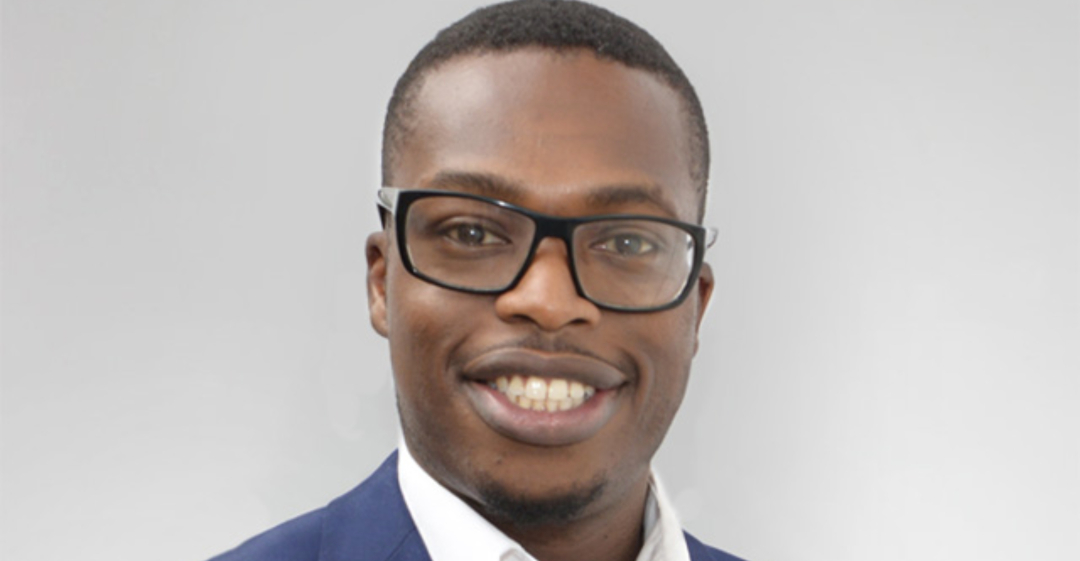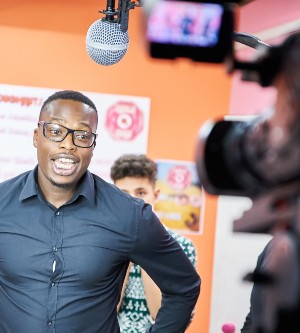“I wanted more stability while still being able to use my entrepreneurial skills.”

What work were you doing previously?
My first career was as a trader, working for five years in financial services.
I started out as a graduate at RBS (Royal Bank of Scotland).
I then made a shift into creating and producing TV shows which I did for about six years.
What are you doing now?
I work as Head of Global Partnerships at a recruitment technology firm that helps young people who want to go into financial services, via virtual simulations.
Why did you change?
In terms of my first shift from finance to TV, it was a bit of an enforced change.
My finance career was going really, really well. As a trader I was young, earning lots of money, in the City. I got the chance to go to New York for two years with RBS who paid for everything including my accommodation. I lived in the heart of Manhattan in a big apartment overlooking the East River.
But then RBS started to have problems during the financial crisis. My contract in their New York office ended and I had to come back to London. Within nine months I got made redundant.
At the time I thought I wanted to go back into banking or business, but I was talking to my cousin who’s a TV producer.
My parents are Nigerian, I was born in the UK, and we'd never seen on TV a British-African family and we were lamenting that. 'Why's that the case?'. She looked at me and said 'why don't we just do it ourselves?'.
And that’s how we created a TV sitcom called Meet the Adebanjos.
My cousin's the creative, I'm the business person. So I approached this as if it’s me going into business and trying to build a company.
I came on board to help, with the idea I’d help get them set up, and then move back into finance but six months turned into six years. I just fell in love with it and decided it was what I was going to do.
In terms of deciding to shift out of TV into what I do now, there were two reasons.
Firstly, we'd finished our third season of the show, and weren't sure if we were going to get enough funding or appetite to do a fourth season.
Secondly, things had changed in my broader life. I’d got married and had a young child. The income of the TV business was up and down. I felt like I’d had my creative adventure, and that it was time to go back into the 'real world' to find something a bit more stable.
Are you happy with the change?
Yes.
I think it’s fair to say that the grass is always greener on both sides. If you work in a corporate, you look at entrepreneurs and wish you could do that. And entrepreneurs may look at people in corporates and wish they could have the steady income and holiday leave.
So I appreciate both sides.
I had to find a job that ticked both of my boxes in terms of being relatively stable, but also allows me to be quite entrepreneurial at the same time. I'm lucky in that I’ve found that where I work now, it’s quite an entrepreneurial role where I'm trying to increase sales and work on partnerships.
What do you miss and what don't you miss?
From TV, I miss the ability to bring ideas to life.
I could be in the shower thinking about how a scene could play out and how to creatively make it funny. Then you see the script, and then you see it playing out while being filmed, and then you see it on screen.
One thing I really liked about what we made was that a lot of families came to me and said, 'your show was one of the first shows I could watch with my child and we'd both laugh at the same time'. So to make a wholesome family show, I was really proud of that.
I don’t miss the intensity of dealing with actors and cast members. There was so much high energy. And imagine you're about to film and an actor doesn't turn up! The stress of dealing with that. But it's all worth it in the end when you see what comes through on screen.
How did you go about making the shift?
For many years I've been involved in a lot of charities that help under-represented groups and people from low-income backgrounds get into banking, as a charity helped me get my foot in the door.
Someone I’d worked with in that sphere said to me 'Andrew I’m not sure if you're looking, but if you are, there is this potential role opening and we think you'd be great for it'. And it just happened to align. It was in diversity talent acquisition.
That role involved cultivating relationships with clients in services firms. One of them came to me and asked if I’d like to work for them. So I moved to work for a financial services firm.
The role didn’t allow me to make as much impact as I wanted to, so I then moved to my current role which is more fulfilling.
How did you handle your finances to make your shift possible?
For my initial shift from finance to TV, I had a financial cushion following redundancy which gave me a bit of a buffer to tide me over for a good few months, although this did run out.
I had to move back into my parents house after having lived in a penthouse in Manhattan! I had to sell my car… but you do what you have to in order to keep your head above water.
Moving back into the corporate world from TV brought a lot more financial stability and I appreciate having that. And I also learnt that I need to be able to be quite entrepreneurial in my work.
It took me quite a while to realise that. When I first came back to the corporate world I went into something that was not so entrepreneurial and was more about just doing the job at hand. A part of me wasn't feeling fulfilled.
But now in my current role I get that balance of having stability while helping a company grow.
What was the most difficult thing about changing?
For me it was around social pressures and social reactions to my shift.
A lot of people become their jobs almost, or are very much associated with what they do. We can get siloed into one professional identity. So when that changes, other people may be accepting, or they might wonder if you're going through some kind of crisis.
Working in finances, my parents were so happy and proud, so when I shifted into TV they responded, ‘oh, what's this show you have? What are you doing?'.
And when you're chasing your dream but it's not quite working out the way you'd hoped, there's that awkward silence at parties... It's dealing with people’s responses, and I think that can weigh on you.
What help did you get? 
It was hard to find people who'd been through a similar path to me (from finance to TV then back into the corporate world), so support was mainly through my family and wife.
I found podcasts and websites about shifts helpful, being inspired by other people's career changes and seeing how they navigated things.
I read books on transition and how to navigate change helpful too. These resources probably helped me more than asking people I knew for advice.
What have you learnt in the process?
Anything is possible.
Don't narrow your mind and your vision to what you've always known. If you really put your mind to something you can do whatever you want.
I also learnt that sometimes you need a push. You might hear 'do the brave step and make your career shift' but often we stay where we are and don't do it unless there's outside impetus or a big event like redundancy. So maybe look at redundancy as a blessing.
If I hadn't been made redundant, the rest of my life probably wouldn't have happened with all the things I’ve done since.
What would you advise others to do in the same situation?
Start earlier rather than later.
Start preparing for your shift while you're in your current job if you can.
If you're thinking of moving, you could do it as a hobby or on the side. You could start volunteering in the thing you want to do in your spare time to build experience.
Always be networking and getting your name out there. Focus on helping people, because you never know in the future who could help you.
And find or create space to figure it out. What really helped me was going on what I'd call 'solo getaways'. I'd go away for a couple of days alone to the coast, sit on the beach and just think.
When there's so much noise in normal day to day life, it's hard to think of what you want to do next in a meaningful way. You can end up jumping on anything if your head’s not clear.
But if you give yourself that time to really think, you'll get more clarity and be able to come up with a strategy to move forward.
You can connect with Andrew on LinkedIn.
What lessons could you take from Andrew's story to use in your own career change? Let us know in the comments below.



